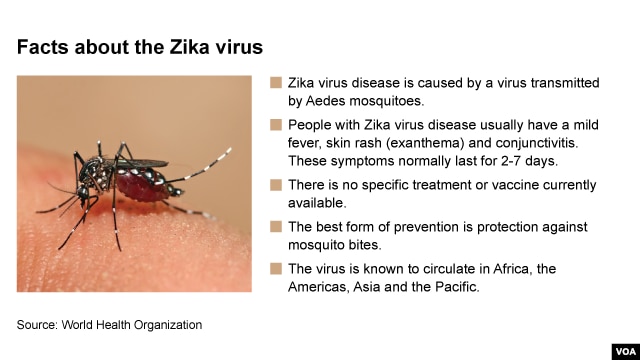BCBSRI obtiene la máxima puntuación de 100 en igualdad laboral para personas LGBTQ+

Zika Virus Spreading Rapidly
The explosion of the mosquito-borne Zika virus in the Americas comes as tens of thousands of people are poised to descend on Brazil later this year for the Olympics, possibly making the international games a springboard to transmit the virus around the world when visitors return home.
Dr. Beth Bell of the Centers for Disease Control and Prevention told VOA «For most people, the Zika virus is not a problem. It can cause mild, flu-like symptoms, but the virus can also cause babies to be born with a serious condition called microcephaly.»
Zika virus has been tentatively linked to 4,000 suspected cases of microcephaly in Brazil, a condition that results in abnormally small heads and brains in newborns. There is no treatment for microcephaly.
Infographic: Areas With Active Zika Virus Transmission
4 million could be affected
The World Health Organization warns the Zika virus is spreading rapidly through the Americas and could affect as many as four million people.
The WHO says the virus has grown rapidly to a public-health threat of «alarming proportions.» Julius Lutwana a virologist at the Uganda Virus Research Institute told VOA that the virus, which was first identified in Uganda in 1947, was long thought to pose only a small risk to humans.
The WHO says people with the Zika virus have a mild fever, skin rash and conjunctivitis (red eye) with symptoms lasting between two to seven days. The best prevention against Zika virus, experts say, is protection against mosquito bites as no vaccine or treatment is available.

Brazil reported its first Zika case in 2015.
Margaret Chan, the WHO’s director general, said Thursday at a special meeting in Geneva that 23 countries and territories in the Americas region have reported Zika virus cases.
She said the Zika virus is “spreading explosively” in the Americas. She has called for an emergency meeting of experts Monday to determine measures to combat the spread of the virus.
Obama calls for quick response
In the United States, President Barack Obama has called for the rapid development of tests, vaccines and treatments for Zika infections.
Obama convened a meeting of senior health advisers to discuss the spread of the virus and its economic and developmental impact on the Americas.
The virus is named for the Zika forest in Uganda where the virus was first discovered in a monkey nearly 70 years ago. It was first believed to affect only primates, and when it was detected in humans, it seemed to cause only mild illness.
Outbreaks in Brazil and elsewhere in southern and central America have led to extensive spraying of insecticides to eradicate mosquitos.
The U.S. Centers for Disease Control has warned pregnant women against traveling to areas with Zika virus outbreaks.
Dr. Anthony Fauci, with the U.S. National Institutes of Health, said the NIH is «working with partners to accelerate research, disease diagnosis, vaccines and therapeutics.»
He says that an existing vaccine platform that was proven safe with the West Nile virus could be repurposed for use in developing a vaccine for Zika. He added, however, that a completed vaccine is several years away.
New cases reported
Health officials in the U.S. state of Virginia said Tuesday a man there tested positive for the virus, but that there was no risk of it spreading to others because it is not mosquito season there.
On Wednesday, a hospital in Denmark said a tourist who had traveled to South and Central America has tested positive for the incurable disease.
Controversy has arisen in El Salvador and Colombia, where authorities have said women of child-bearing age should postpone getting pregnant. In Brazil, 200,000 troops are traveling to homes to distribute pamphlets offering advice on eradicating mosquitos, while crews are also fumigating areas that will be used for upcoming carnival celebrations and this year’s Olympics.
The WHO’s regional office in the Americas said Monday the most effective ways to stop the virus from spreading are to reduce mosquito breeding sites and for people to protect themselves from bites with insect repellent, nets, screens and clothing that covers as much of the body as possible.


